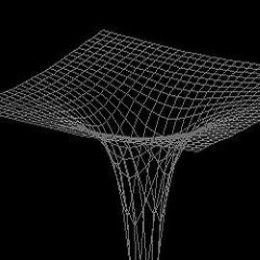Albert Einstein - blackbox force fields and light

Below are two good English translation extracts from Einstein's
1912 lecture manuscript on his Special Theory of Relativity, giving
some of his then black-box thinking on 'multiple continuum ethers' to
explain how electromagnetic forcefields might work with a spacetime gravity continuum but not
necessarily to be taken as correct explanation. Einstein here also seems to require that his spacetime gravity continuum must work by some form of unexplainable magic, and gives
one of his various definitions of the principle of the constancy of the
velocity of light, not specifically including constancy relative to
moving observers.
-- Pictured here is the dubious rubber-sheet analogy of a bit of Einstein's spacetime continuum near a single gravity source. How could it really work, and how could the theory really work at all for common multiple gravity source situations like a solar system ?
A bit of black-box Einstein.

Albert Einstein, 1912 Manuscript on the Special Theory of Relativity.
A piece of Einstein's earlier black-box thinking on how electromagnetic fields work [with his energetic-matter still being pushed around like dead-matter ?]. (Manuscript page 6.)
"Lorentz conceives of electricity as being bound to corpuscles
of molecular dimensions (electrons in the broader sense), a
conception whose validity is hardly doubted today. But
complications are thereby created for the theory, in that one is
dealing here with field quantities that vary rapidly with location
and that are to be replaced, then, by suitable mean values.
One can avoid these complications without doing any essential
damage if one proceeds in the following way. According to the
picture that Lorentz's conception gives, we have to conceive an
electrically polarizable body in the following way. In every unit
volume of a body in an electrically neutral state there are present
at least two approximately evenly distributed kinds of electrons of
zero total charge. But these are not freely movable; instead, they
are linked to matter by elastic forces (in the simplest case). An
electric field displaces the positive and negative electrons from
their equilibrium position by means of oppositely directed forces.
In this process, the electromagnetic field varies extremely rapidly
with location.
We avoid this by conceiving of the positive as well as the negative
electrons of the same kind as being combined into continua. In the
simplest case, we have to picture an inertia-free electrical
continuum of positive density and, in the case of an electrically
unexcited body, one of equally great negative density, linked
elastically to the matter. If we also wish to represent the
conductivity of the body, we introduce, in addition, two further
electrically opposite density-continua that can move relative to
the body by overcoming a kind of friction.
There is nothing strange in the introduction of several continua at
the same location if one realizes that this is only an idealization
aimed at avoiding mathematical complications."
One Einstein definition of the principle of the constancy of the velocity of light, not specifically including constancy relative to moving observers. (Manuscript page 16.)
"Hence, in accordance with Lorentz's theory we can proclaim the
following principle, which we call "the principle of the constancy
of the velocity of light":
There exists a coordinate system with respect to which every light
ray propagates in vacuum with the velocity c.
This principle contains a far-reaching assertion. It asserts that
the propagation velocity of light depends neither on the state of
motion of the light source nor on the states of motion of the
bodies surrounding the propagation space."
Einstein's time measurement assuming zero reaction times to light signals, first put in his 1905 paper 'On the Electrodynamics of Moving Bodies' introducing his relativity theory ;
".... evaluating the time of events by stationing an observer with a clock at the origin of the coordinates, who assignes to an event to be evaluated the corresponding position of the hands of the clock when a light signal from that event reaches him through empty space."
Bodies tell Einstein's continuum how to curve, and the continuum tells bodies how to move.
In Einstein's general relativity bodies impose curves on his
time-space-gravity continuum, and the continuum imposes motion on
bodies. Although push-physics analogies are often used to 'explain'
this, the theory does not specifically involve any push-physics mechanism and
indeed does not specify any clear mechanism for this. Gravitational
forces of any kind are completely abolished as controlling the
motion of planets or other bodies, and somehow space-curves do this
- logically by pushings but seemingly without having any push
properties since the continuum is non-material ?
As you can read in our 'Einstein's Continuum' section, Einstein
concluded that "The ether of the general theory of relativity is a
medium which is itself devoid of all mechanical and kinematical
qualities, but helps to determine mechanical (and maybe electromagnetic)
events." This seems to leave his continuum(s) as more information
entities like Gilbert's signal effluvia. But if this leaves the
improved maths of Einstein's theory with an unrealistic
explanation, then his theory must be basically taken (as Newton
wanted his theory taken) as a blackbox theory with real explanation
unknown.
Of course it is a general failing of modern physics theories,
supposed to replace part or all of Newton's theory, that they are
not written as his Principia or even as its chief parts for
comparability - but are instead written in ad hoc manner often in
brief articles chiefly with reference only to black holes,
wormholes or other exotic claimed phenomena.
Otherwise, if you have any view or suggestion on the content of
this site, please contact :- New Science
Theory
Vincent Wilmot 166 Freeman Street Grimsby Lincolnshire DN32
7AT.
You are welcome to link to any page on this site, eg www.new-science-theory.com/albert-einstein.php
IF you like this site then
OR maybe make a small donation ; (it will help with site development, and just possibly with some experiments long planned but never afforded.)
© new-science-theory.com, 2025 - taking
care with your privacy, see New Science Theory HOME.